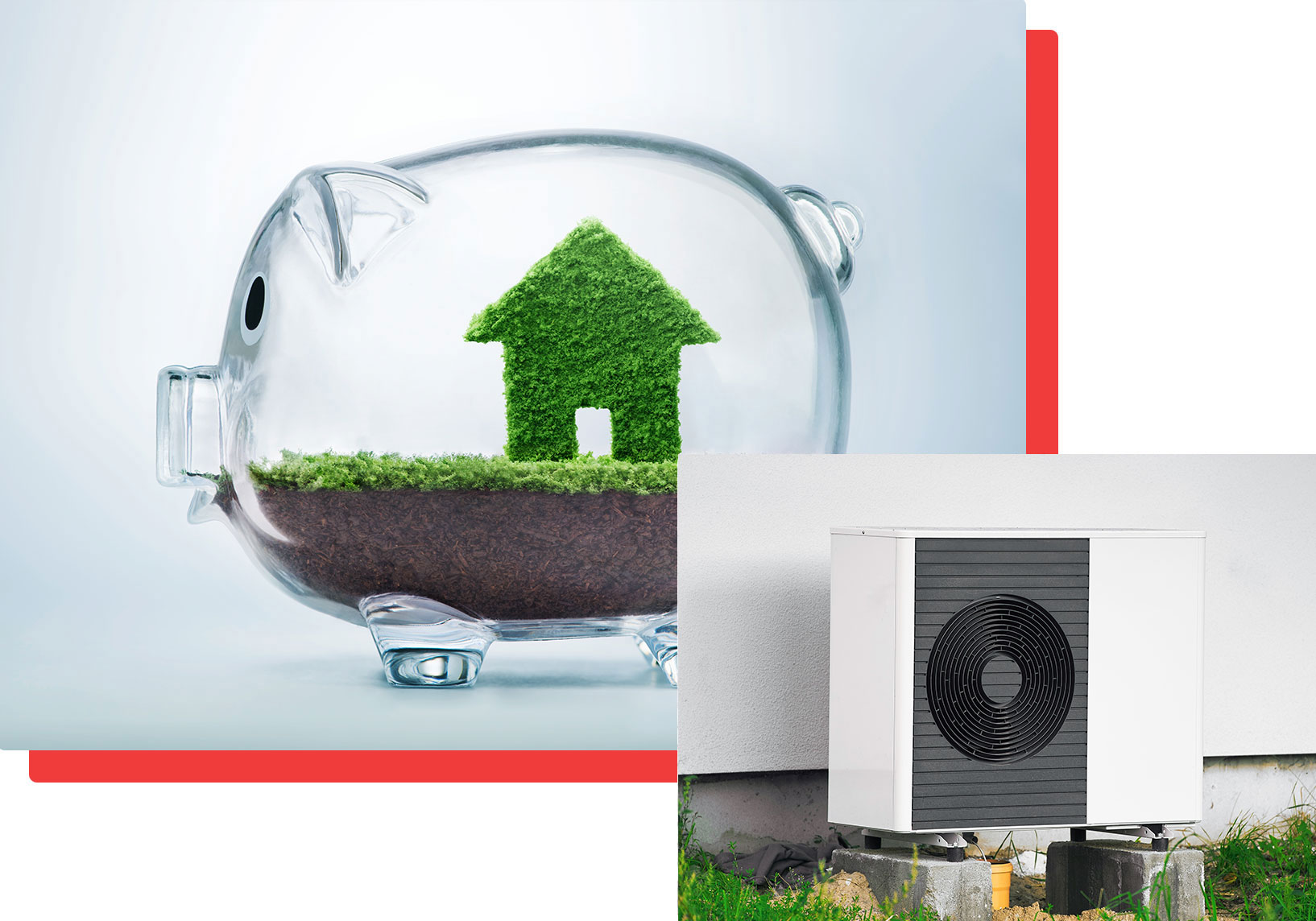Effective January 1, 2024, Geo Source One is now a part of Patriot Air Comfort Systems.
Geothermal Systems Columbus Ohio
Geothermal: The Top Choice for Eco-Friendly, Energy Efficient Heating & Cooling
A staggering 50,000 geothermal HVAC systems are installed each year in homes and businesses because they can slash heating and cooling bills by up to 70%. As the top energy-efficient and eco-friendly choice globally, geothermal is the way to go. If you’re ready to cut your energy costs, then it’s time to “GO GEO!”



Geothermal Installation
Patriot Air is your trusted partner for sustainable home comfort. Our expert technicians are adept at installing state-of-the-art geothermal HVAC systems. We understand the importance of a seamless transition to renewable energy solutions for your home. That’s why we offer a complimentary, no-obligation estimate to guide you through the planning and preparation stages of your geothermal system installation. Take the first step towards eco-friendly heating and cooling. Click below to schedule your free estimate and embark on the journey to a greener, more efficient home with Patriot Air.
Geothermal Maintenance
Patriot Air is committed to ensuring your geothermal HVAC system operates at peak performance year-round. Our seasoned technicians specialize not only in installation but also in comprehensive maintenance and support for your geothermal solution. Regular service from Patriot Air means prolonged efficiency and reliability, safeguarding your investment and home comfort. Experience the peace of mind that comes with our dedicated care. For a hassle-free, no-cost evaluation of your geothermal system’s maintenance needs, click below. Let Patriot Air keep your renewable energy source in top condition.
Geothermal Repair
At Patriot Air, we understand that timely and effective repair is crucial for the longevity of your geothermal heat pump. Our skilled technicians are fully equipped to diagnose and resolve any issues, ensuring your system runs smoothly and efficiently. Whether it’s routine wear and tear or unexpected breakdowns, we’re here to provide you with dependable repair services. Don’t let disruptions chill your comfort or overheat your worries. Click below to request a timely service appointment. Our technicians will restore optimal performance to your geothermal heat pump in no time.
Homeowners installing geothermal systems receive substantial tax credits, reducing installation costs and making the eco-friendly upgrade more economical.

Geothermal heat pumps (GHPs) provide consistent heating, cooling, and hot water by using the earth’s steady underground temperature for year-round comfort.

Geothermal heat pump systems offer long-term value, with indoor components lasting 25 years or more and ground loops over 50 years, so you can recoup the investment within ten years.

Geothermal: A Great Antidote to Costly Utility Bills, Limited Versatility, and Damaging Greenhouse Gasses
Some traditional HVAC systems cause homeowners to face high utility bills and wasted energy, often due to leaky ductwork. These systems also lack versatility, requiring separate units for heating and cooling, resulting in higher installation costs and more space used.
Additionally, they contribute to increased greenhouse gas emissions. A geothermal heat pump system can address these problems by being much more efficient, space-saving, and environmentally friendly.
Patriot Air Geothermal: Serving Your Complete Heating & Cooling Needs
Patriot Air serves the greater Central Ohio area with a full range of Water Furnace geothermal heating and cooling systems. By trusting your geothermal heating and cooling needs to Patriot Air, you can be assured that you are making a valuable investment in the energy efficiency of your home with a residential heating system that works reliably when you need it most, especially during those cold weather months.
CERTIFIED: Emergency Geothermal Services
SATISFACTION: 100% Customer Satisfaction Guaranteed
FINANCING: We Offer a Variety of Financing Options
PRICING: Fair, Transparent Pricing

The Geothermal Installation Process is Simple
For more information on the installation and service of our geothermal heat pump systems, contact Patriot Air today. We have served residents of the greater Central Ohio area since 2004 and will be proud to serve you, too.
Installing a geothermal heating and cooling system involves our streamlined four-step process:
Inspection
A home inspection and examination to determine the best size geothermal system for your home’s heating and cooling needs.
Scheduling an Appointment
Schedule service and choose a day and time to complete the install. The installation process can take up to a full day and may involve 2-5 technicians.
Preparation
Proper preparation of the workspace, including clearing out necessary areas and placing drop cloths in the work path.
Post-Installation
Keep your system running optimally with our geothermal maintenance and geothermal service plans.
Cleanup
Full cleanup of workspace following the HVAC project.

Keep Your Family Comfortable All Year-Round: Say Goodbye to Extreme Heat and Cold
Ohio weather can be brutal, and the last thing you want for your family is blistering heat inside your home during the summer and bone-chilling cold in the winter. You don’t have to suffer through Ohio’s unpredictable temperatures with a geothermal HVAC system.
Your geothermal heating and cooling system uses the earth’s constant temperature to work effectively and efficiently, providing you with reliable climate control and lower energy costs throughout the seasons while saving on heating and cooling bills.
We the People, Love Patriot Air

Fast & Efficient Service...
Patriot Air showed up on time, checked out my furnace, and within minutes of being there not only diagnosed the problem, but had the parts on the truck to fix it. Within thirty minutes, my furnace was blowing hot air again. Brian, the technician gave me tips on how to take better care of my furnace and even showed me how to change the air filter by myself. I couldn’t be happier and I’ve found my heating and cooling company for life. Thank you Patriot Air!

Patriot Air to the Rescue...
Our furnace went out while we were at work, and we came home to a freezing house. We have small children, so having it too cold in the house isn’t an option. We called around to a few places, and Patriot Air was the only HVAC company to return our call and immediately rushed a technician to our house. I can’t thank them enough for putting my family first and ensuring my kids had a warm home to sleep in. I tell everyone that Patriot Air is the only HVAC company I’ll ever call again.

Knowledgeable & Professional...

Honest & Courteous...
Having a fixed income with unexpected expenses, like fixing the heating and cooling systems, is hard. Luckily for us, Patriot Air is a company that doesn’t nickel and dime you to death and is very fair-priced. They didn’t try to sell us anything we didn’t need and made sure we were comfortable with the price before they did any work. We were able to afford our repairs through their financing program. Now our central air is working wonderfully.
Frequently Asked Questions
Are there any incentives for installing geothermal heating and cooling systems in Central Ohio?
Homeowners in Central Ohio region may be eligible for various incentives for installing energy-efficient systems like geothermal heat pumps. These could include federal tax credits, local rebates, or incentives from the Environmental Protection Agency (EPA) and Energy Star programs. It’s advisable to consult with local geothermal installation experts like the team at Patriot Air Comfort Systems to learn about current incentives that could reduce the overall installation cost.
Are permits and approvals necessary for geothermal HVAC system installation?
Yes, installing a geothermal HVAC system requires permits and approvals from local authorities, which is not always the case with traditional systems. Whether opting for closed-loop systems or open-loop systems, homeowners must comply with all local regulations, and the cost of permits varies depending on system type and location. It’s essential to secure the proper permits for ground loop installation to ensure your system is legally compliant and to take advantage of potential tax credits for Central Ohio residents, and others investing in such energy-efficient systems.
What advantages do geothermal HVAC systems have over traditional systems?
Geothermal HVAC systems are more energy-efficient than traditional heating and cooling systems, leading to lower utility bills and a smaller carbon footprint. They utilize stable groundwater or soil temperatures to transfer energy, providing consistent indoor temperatures regardless of the outdoor temperature. Additionally, such systems can offer free hot water as a byproduct of their operation. While the installation may be more complex, requiring multiple loops and specific heat transfer fluid to circulate through the heat exchanger, the long-term benefits and potential tax credits often offset initial costs and installation complexity.
What should I expect in terms of service calls and maintenance for a geothermal unit?
Geothermal systems typically require fewer service calls than conventional heating and cooling equipment. They have fewer moving parts, which means less wear and tear. However, regular heat pump service by qualified geothermal services can ensure optimal efficiency and prolong the lifespan of your system.
Can geothermal systems reduce my energy costs during the summer months in Columbus?
Yes, geothermal heat pumps are highly efficient systems for both heating and cooling. During the summer months, they cool your home by removing hot air and transferring heat back into the ground. This process makes for extremely efficient heating and cooling, which can significantly lower your energy costs compared to conventional systems.
How does installing a geothermal HVAC system differ from a traditional heating and cooling system?
Geothermal HVAC installations integrate a heat transfer network beneath the ground, unlike traditional systems that typically operate above ground. The process requires more space; most residential lots can accommodate a horizontal loop, while smaller properties might need vertical loops. Geothermal installations also often entail working around existing landscaping and ensuring no buried utility lines are disturbed. In contrast, traditional systems are less invasive and quicker to install, not requiring significant alterations to your property’s layout.
What are the advantages of installing a geothermal heat pump in Central Ohio?
In Central Ohio’s varied climate, a geothermal heat pump provides heating and cooling by transferring heat between your home and the ground. This system maintains a constant temperature inside your home, leveraging the earth’s steady underground temperature. It’s more energy-efficient than conventional systems, using renewable energy to exchange heat, which can lead to significant cost savings on energy bills.

